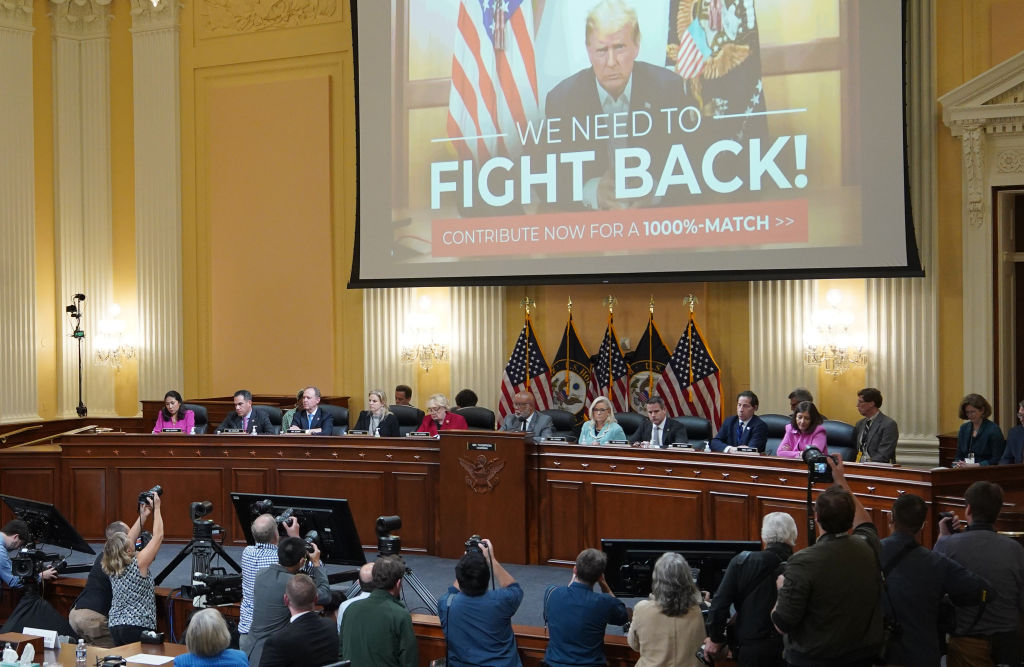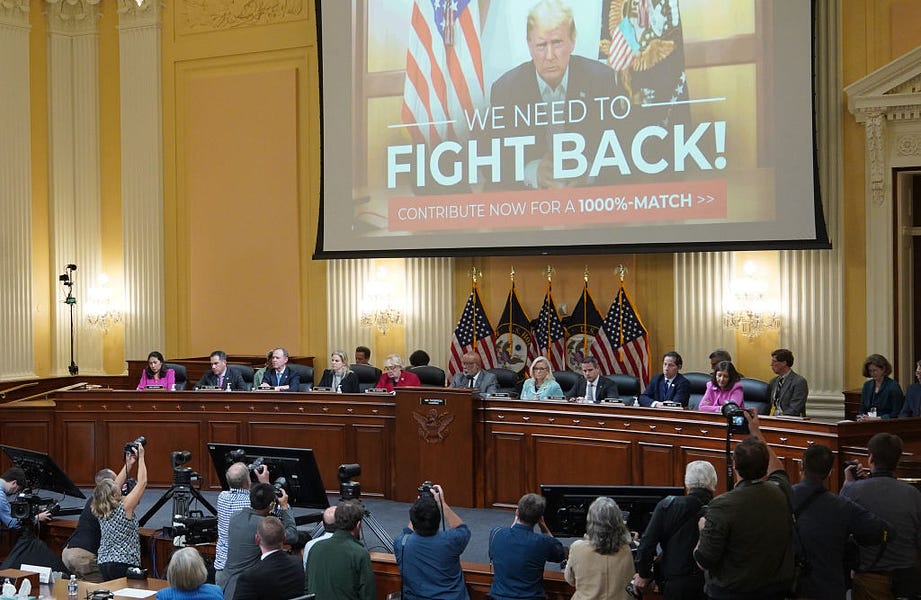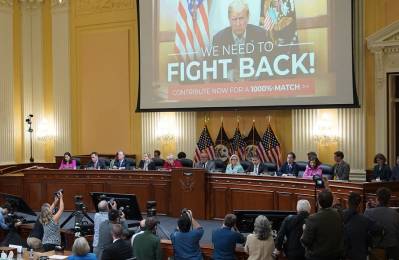This email is arriving in your inbox just before Steve Hayes, Sarah Isgur, and I take a deep dive into the January 6 Commission hearings on Dispatch Live tonight at 8:00 p.m. If you’re not a Dispatch Member, you can join now and not miss a moment. Dispatch Live is one of the most popular things we do, for good reason. Your questions are excellent, our guests are great, and my colleagues are among the best in the business. Join and watch tonight. You won’t regret it.

It’s hard to surprise me anymore, and it’s certainly hard to surprise me with any revelation from the Trump White House or the Trump campaign. So I can’t say that I was surprised when the January 6th Commission exposed the Trump campaign’s remarkably dishonest fundraising operation after the November election. But I was enraged, and I was enraged in part because I know some of the people he conned. I know their sincerity, and I know exactly how the MAGA right monetizes both their faith and their fears.
The details are damning. All told, the Trump campaign raised a stunning amount of money to support an election steal effort that it knew was bogus from the beginning. Not only were the numbers staggering, millions of dollars were immediately diverted into the hands of Trump allies and Trump entities.
In short, the plot to overturn the election wasn’t just insurrection; it was also an extraordinary financial grift. The commission played a video featuring Amanda Wick, a senior investigative counsel for the committee, describing the scam:
"As the select committee has demonstrated, the Trump campaign knew these claims of voter fraud were false, yet they continued to barrage small dollar donors with emails, encouraging them to donate to something called an Official Election Defense Fund," Wick said.
"Claims that the election was stolen were so successful, President Trump and his allies raised $250 million, nearly $100 million in the first week after the election," Wick said.
She added that the committee discovered that the fund did not exist.
Instead, she said, Trump created a different entity called the Save America PAC and then funneled most of the funds into this new organization. it then “gave millions in contributions to pro-Trump organizations.”
How could this happen? How could so many people give so much money to a campaign that was transparently frivolous and—at times—incandescently amateurish? How could any person watch, for example, Rudy Giuliani’s display at Four Seasons Total Landscaping and believe their money was being well spent?
To understand the cash haul, you have to understand the mindset of the truly fervent Trump supporter—how they view Trump and how thoroughly they’ve been inoculated against any form of mainstream critique.
Of course any understanding of loyalty to Trump has to start with an underlying or pre-existing state of fear and anxiety about the state of the country. Absent that anxiety, a man like Trump never gains traction.
But that’s a woefully insufficient explanation not just for the initial devotion for Trump, but for the way that devotion deepened and expanded throughout his presidency—to the point where he received 74 million votes, raised a quarter-billion dollars for an attempted coup, and still commands the loyalty of tens of millions, even after the full dimensions of his con have been thoroughly exposed.
The explanation rests in an understanding of Trump that’s utterly alien to the majority of Americans, even to many Republicans. Talk to his most devoted supporters, and he’s not a flawed man who’s simply better than the Democrats—he’s a great man, chosen by God to confront a great evil.
I’ve heard the Trump great man narrative many, many times in the seven years since he came down the escalator and announced his candidacy. In its most simple form it goes like this: Donald Trump is a self-made billionaire who abandoned his life of luxury in his later years to save the country he loves. Rather than continue to accumulate wealth, he left Trump Tower and exposed himself to the hatred of the Democrats and the wrath of the Republican establishment to do what no other Republican had the courage to do—drain the swamp and truly fight the left.
Because this greatness narrative is rooted in part in Trump’s supposed courage in the face of relentless attacks, the very existence of the furious response to Trump validated Trump. This is where the so-called anti-anti-Trump personality was central to the formation of the Trump myth. While the MAGA pundits extolled Trump’s virtues, the anti-anti-Trump voices proved the perfidy of his opponents. Their (slight) separation from Trump allegedly demonstrated that they were “honest brokers” who were merely “calling it as they see it.”
Make no mistake, the anti-anti-Trump personality could often accurately call out media excesses and Democratic extremes. But their sin of omission was the consistent failure to accurately and fairly grapple with the things Trump actually did, versus constantly calling out those critics who went too far.
Here’s the way I’ve tried to describe the business model of anti-anti-Trump media to those who don’t pay close attention to politics: Let’s imagine for a moment that Trump does something that’s an eight on a scale of one to ten. It’s dreadful but not catastrophic. Incompetent but not impeachable.
Invariably you’d find any number of media voices on the left or the Never Trump right who’d say, “That’s a ten! Trump just did the worst thing!” The anti-anti-Trump voice pounces. They mock the person who says it’s a ten. They write an explainer as to why it’s not a ten. They go on Fox and laugh at the critics who’ve gone too far.
What’s missing? Any effort to grapple with the fact that Trump had done something seriously wrong. The entire story is the media’s excess.
After a time, the process grew so predictable that it was almost funny. Trump would say or do something outrageous. The anti-anti-Trump faction would grow curiously silent online. But they weren’t silent because they were writing something critical of Trump. They were just waiting for that first CNN segment to cross the line, and then they were off to the races, condemning the left or mocking Never Trump.
Now let’s introduce the religious element. For a significant number of Trump’s followers, his greatness wasn’t simply a matter of his secular success, but of his alleged divine appointment. Some called him a King David figure. Some called him a Cyrus figure. Both comparisons, however, reflected a common belief—that Trump was God’s chosen man to America.
And this made the persecution narrative all the more potent. It rendered Trump’s arc downright biblical. After all, how many times does scripture describe ferocious, even deadly opposition to the “Lord’s anointed”?
And let’s finish with a dash of class conflict. As many of Trump’s most savvy advisers knew, his ignorance and incompetence could work for him—so long as you could cast his critics as sneering, condescending elitists. Thus, they’d sometimes seed his tweets with intentional misspellings, hoping to draw mockery from the press. By the time Giuliani stood in front of Four Seasons Total Landscaping, Trump’s core supporters were utterly immune to any claim that he or his team was out of control, disconnected from reality, or simply too incompetent to be trusted.
All that was elitist talk. And elitists were the enemy.
At this point a smart Trump supporter will point out to me that the media and Democrats frequently did go too far in critiquing Trump. They’ll point out that there are members of the cultural and political elite who do sneer at working-class voters. And of course they’re right. Any halfway-competent anti-anti-Trump pundit had a lot of material to work with. But that did not excuse the consistent, relentless refusal to grapple with Trump’s actual failures.
I feel an immense amount of sympathy for many millions of Donald Trump’s most dedicated supporters and donors. I feel sympathy for them in the same way that I feel sympathy for the victims of pyramid schemes and other large-scale cons. Could they have been more diligent and evaded the scam entirely? Certainly. But do we place the primary responsibility for a successful scam on the con artist or his mark? It’s the con artist who bears the lion’s share of the blame, by far.
And in this case, the con artist had help. A layer of aides and pundits and talk show hosts and social media personalities helped him fleece the base, and they shared in the largesse. The amount of money that flowed in and through the MAGA machine was incredible to behold.
I know people who wrote checks to “stop the steal.” I’ve known and loved them for decades. And while I’m frustrated with them, I honestly find it hard to be angry. They’ve been conned. People they trusted—people who know better—told them that a bad man was a great man, that truth was lies and lies were truth, and that Trump’s triumph was part of God’s divine plan. Yes, they should have known better, but let’s put the lion’s share of the blame exactly where it lies—with Donald Trump and the right-wing media who transformed millions of Americans into their own personal ATM.
One last thing …
We highlighted this report by Ryan Grim in The Intercept in The Morning Dispatch, but in case you haven’t seen it or read it yet, I really want to emphasize how interesting and enlightening it truly is. Progressive advocacy groups are engaged in a remarkably self-destructive cycle of internal combat. Here’s Grim:
Twitter, as the saying goes, may not be real life, but in a world of remote work, Slack very much is. And Twitter, Slack, Zoom, and the office space, according to interviews with more than a dozen current and former executive directors of advocacy organizations, are now mixing in a way that is no longer able to be ignored by a progressive movement that wants organizations to be able to function. The executive directors largely spoke on the condition of anonymity, for fear of angering staff or donors.
“To be honest with you, this is the biggest problem on the left over the last six years,” one concluded. “This is so big. And it’s like abuse in the family — it’s the elephant in the room that no one wants to talk about. And you have to be super sensitive about who the messengers are.”
More:
This is, of course, a caricature of the left: that socialists and communists spend more time in meetings and fighting with each other than changing the world. But in the wake of Donald Trump’s presidential election, and then Joe Biden’s, it has become nearly all-consuming for some organizations, spreading beyond subcultures of the left and into major liberal institutions. “My last nine months, I was spending 90 to 95 percent of my time on internal strife. Whereas [before] that would have been 25-30 percent tops,” the former executive director said. He added that the same portion of his deputies’ time was similarly spent on internal reckonings.
“Most people thought that their worst critics were their competitors, and they’re finding out that their worst critics are on their own payroll,” said Loretta Ross, an author and activist who has been prominent in the movement for decades, having founded the reproductive justice collective SisterSong.
One reason why this national moment feels so precarious is that it’s hard to find any cultural, political, or religious sector in American life that’s truly healthy and functioning. I know there are still healthy organizations, but different kinds of rot are reaching into different kinds of spaces, and Grim’s piece offers a window into a world that many of us don’t often see.







Please note that we at The Dispatch hold ourselves, our work, and our commenters to a higher standard than other places on the internet. We welcome comments that foster genuine debate or discussion—including comments critical of us or our work—but responses that include ad hominem attacks on fellow Dispatch members or are intended to stoke fear and anger may be moderated.
With your membership, you only have the ability to comment on The Morning Dispatch articles. Consider upgrading to join the conversation everywhere.